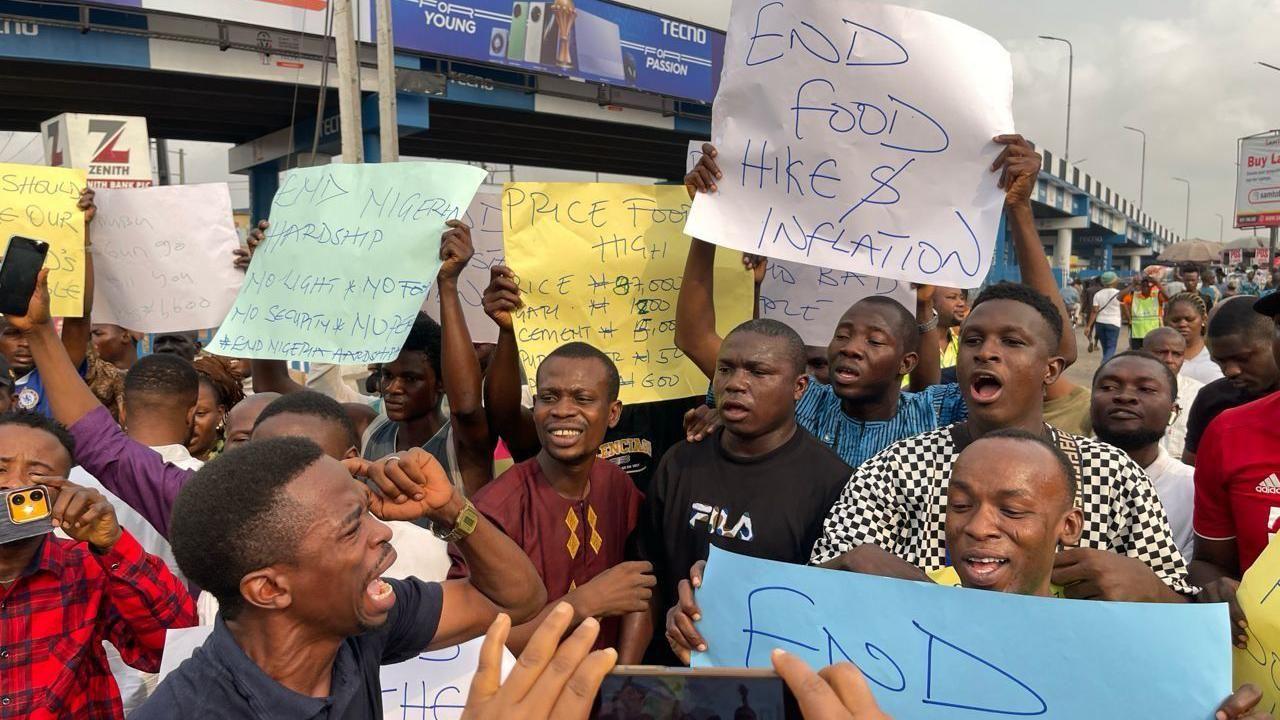
Basic food items don become too expensive for many Nigerians to afford.
For some parts of di kontri, pipo don begin enta streets to protest di continuous rise in food prices for Africa biggest economy.
Many pipo all ova di world dey feel di high cost of living and pressures of inflation but di mata worse for Nigeria, sake of di fuel subsidy goment remove plus di persistent weakening of di naira, di kontri local currency, against major foreign currencies.

Why Nigerians dey unhappy?
Hunger na di main reason Nigerians no dey happy and why dem dey protest.
Recently, thousands of Nigerians enta streets for di northern states of Niger, Kano and Kogi and Ibadan for western Nigeria, to demand urgent interventions wey go address di rising cost of living.
For Kano State, wia di cost of staple food items including rice, millet and maize don rise, around 10 million pipo dey live below poverty line, di highest for di kontri.
Last week, Nigeria National Bureau of Statistics (NBS) report say inflation dey at 29.9%, di highest in almost three decades, na food inflation rise pass to 35.4%.
How expensive food don become for Nigeria?
Di price of bread, one common food wey many families across di kontri dey chop as breakfast don jump from 500 naira ($0.33) go ova 1,500 ($0.87) within a year.
Di prices of oda food items like eggs, fish, meat, rice, and vegetable oil don also go up well-well. One 50kg bag of rice, di most popular staple food, now cost 75,000 naira, from 35,000 naira wey e be in di past one year.
Di Nigeria Labour Congress (NLC) don give di goment 14-day ultimatum to find solution to di economic crisis, as dem threaten to go on nationwide strike on 27th and 28th of February.
Di union tok say di situation dey worse for Nigerian workers wey dey collect minimum wage of 30,000 naira ($20) a month.
Di African Development Bank (AfDB) don sama warning say Nigeria, Kenya plus Ethiopia and Angola dey at risk of social unrests sake of di rising fuel and food commodity prices.

Which food pipo dey switch to?
For some northern parts of di kontri, residents don begin collect waste from rice millers to eat as food.
Di waste product na ingredient wey dem dey use for di production of fish feed, but now na wetin some Nigerians fit afford to reduce hunger.
Social media videos also dey spread wey show how several Nigerian homes dey ration food and portion sizes.
One video show as one woman cut one piece of fish into nine portions instead of di average four to five pieces. She say na di only way to ensure say her family fit eat fish two times a day.

Wetin goment dey do?
Nigeria Vice President Kashim Shettima don announce di establishment of one board wey dia work na to control and regulate food prices.
Di goment don also order di national grain reserve to distribute 42,000 tonnes of grains, including maize and millet.
Dis no be di first time di goment go tok say dem dey distribute aid give poor and vulnerable Nigerians.
Dia method of food distribution however don often come under questioning from labour unions wey tok say most of am no dey reach di poorest families in need.
Who else dey offer solutions?
Some employers don respond to di economic crisis by reducing di number of days in a week wey dia staff dey expected to show physically for work, to save transport costs.
Some companies also increase staff salaries by ova 50% to catch up wit di cost of inflation.
Some major animal feed producers don tok say dem go suspend di purchase of raw materials including maize and sorghum, so as to boost di availability of grains for markets for human consumption. Dis decision go get adverse effect on di livestock industry, one key part of di food cycle for Nigeria.






